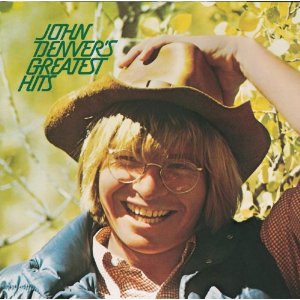Win John Denver’s Greatest Hits CD this weekend March 12 and 13 from KFFB 106.1. Call and register when asked to on the air at 1-800-896-1669 or register on line at www.ourcontestonline.com
This review is from: John Denver’s Greatest Hits (Audio CD)
Long after his untimely death in 1997, John Denver’s songs continue to flicker through America’s collective unconscious. Everyone, even the hip hop generation, can sing “Take me Home, Country Roads” and “Rocky Mountain High.” Time has actually treated the oft-maligned Denver, born Henry John Deutschendorf, Jr., rather well. Stripped of the 1970s music culture that derided him as sappy, corny, hokey, shallow, and the essence of uncool, his songs can finally speak for themselves. The era of “art” and “glam” rock had no patience for a “high on life” grinning ear-to-ear songwriter who, to them, resembled the Marlboro Man’s disowned hippy son. He got it from all sides. After climbing up the rock/pop charts, Denver soon began to score on the country charts. He became a crossover phenomenon, which meant, in his case, that neither the rock/pop nor the country music communities accepted him. Like usurped royalty they watched as his albums sold millions.
No album of Denver’s outsold “John Denver’s Greatest Hits.” According to the RIAA, it has sold over nine million copies in the United States and still occupies a spot on their top 100 all-time best selling albums list. But its title remains a slight misnomer. At the time of its release in 1973 only four of the album’s eleven songs really qualified as “hits.” The others had appeared on his then neglected first three albums, released between 1969 and 1970. Those nonstarters nearly ended his career with a splat. Then, a miracle. The final album of his four album contract, 1971’s “Poems, Prayers, and Promises,” included the now archetypal “Take Me Home, Country Roads.” In a flash Denver became ubiquitous. Another gargantuan hit followed in 1972, “Rocky Mountain High,” that solidfied the Cheshire Cat nature boy as a major celebrity. The fuse was lit. “Sunshine On My Shoulder” soared to number one in 1974, outdoing both “Country Roads” and “Rocky Mountain High,” following the release of this “Greatest Hits” compilation. Self-fulfilling prophecy, indeed. The remaining qualifying “hit”, “Leaving On a Jet Plane,” wasn’t even a John Denver hit. Though he wrote the song, it was Peter, Paul and Mary that launched it up the charts in 1967. He recorded it for his first solo album, 1969’s “Rhymes & Reasons,” but the album went nowhere. Paradoxically, regardless of the fact that this “Greatest Hits” album only contains a few actual “hits,” the album nonetheless remains Denver’s biggest hit album.
Not only that, Denver actually re-recorded many of the older songs specifically for this collection. As he says in the apologetic liner notes: “I felt that some of these songs had grown a bit, that I am singing better than I was four or five years ago, and that I would like to treat some of the songs a little differently than I had in the original recordings.” This very unorthodox, and unprecedented, approach to a greatest hits collecton gives the album a very consistent sound. Instead of a creating a collage of styles and production values, Denver essentially constructed an entirely new album. This allowed the once neglected songs to take on a new life. He made them sound like hits.
The songs on this album capture the sound and feel of their era. Just listen. A mere nanosecond of “Country Roads” has enough potency to evoke now whispy images of dark paneled walls with moving waterfall beer signs, oversaturated technicolor landscapes, three-channel television playing documentaries on Sasquatch and Nessie, ubiquitous ashtrays, wide aisled department store dreams, and analog living standards. “Rocky Mountain High” contains enough Americana one can almost imagine Woody Guthrie singing it. Almost. The 1970s would not have sounded the same without John Denver, which, though some may have preferred, detractors cannot deny.
John Denver remains one of the most adored and satirized singer songwriters in recent memory. He had the “honor” of being strangled on a Monty Python Record (resulting in a defamation lawsuit that he won), as well as being honored with numerous awards and tributes following his accidental death. He even embraced conservation long before it went mainstream. “Greatest Hits” captures his career on the early upswing, but not quite at its peak. He continued to dominate the radio and television airwaves throughout the 1970s. “Greatest Hits Volume II” continues the story.







